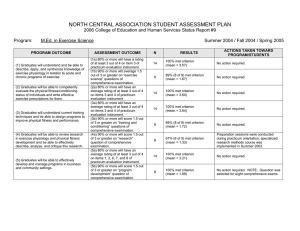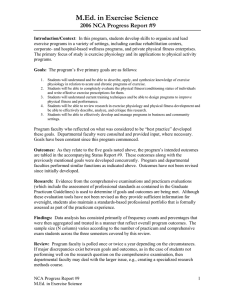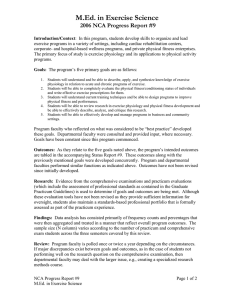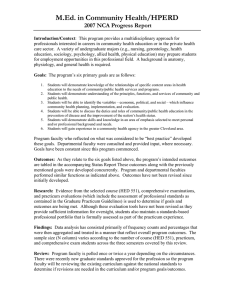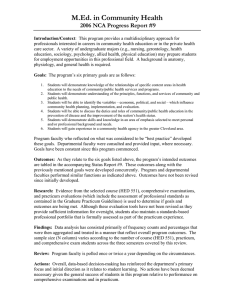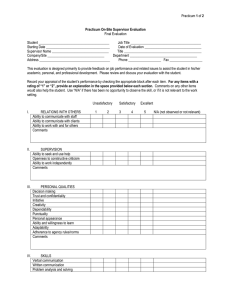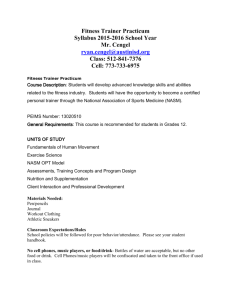M.Ed. in Exercise Science 2007 NCA Progress Report
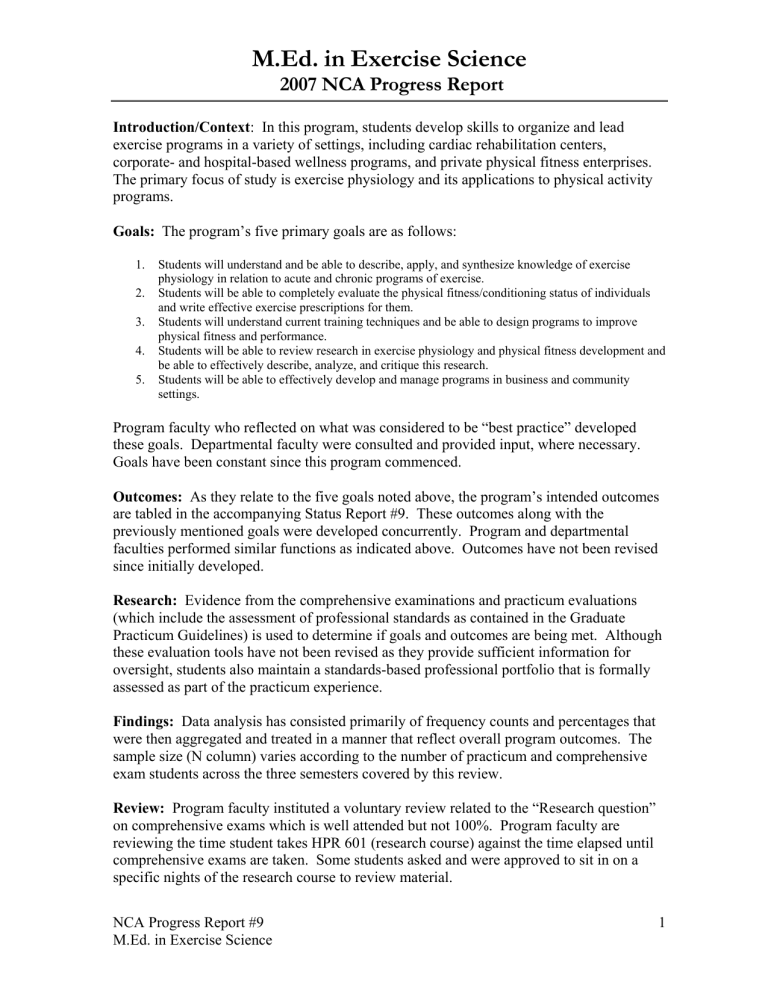
M.Ed. in Exercise Science
2007 NCA Progress Report
Introduction/Context : In this program, students develop skills to organize and lead exercise programs in a variety of settings, including cardiac rehabilitation centers, corporate- and hospital-based wellness programs, and private physical fitness enterprises.
The primary focus of study is exercise physiology and its applications to physical activity programs.
Goals: The program’s five primary goals are as follows:
1.
Students will understand and be able to describe, apply, and synthesize knowledge of exercise physiology in relation to acute and chronic programs of exercise.
2.
Students will be able to completely evaluate the physical fitness/conditioning status of individuals and write effective exercise prescriptions for them.
3.
Students will understand current training techniques and be able to design programs to improve physical fitness and performance.
4.
Students will be able to review research in exercise physiology and physical fitness development and be able to effectively describe, analyze, and critique this research.
5.
Students will be able to effectively develop and manage programs in business and community settings.
Program faculty who reflected on what was considered to be “best practice” developed these goals. Departmental faculty were consulted and provided input, where necessary.
Goals have been constant since this program commenced.
Outcomes: As they relate to the five goals noted above, the program’s intended outcomes are tabled in the accompanying Status Report #9. These outcomes along with the previously mentioned goals were developed concurrently. Program and departmental faculties performed similar functions as indicated above. Outcomes have not been revised since initially developed.
Research: Evidence from the comprehensive examinations and practicum evaluations
(which include the assessment of professional standards as contained in the Graduate
Practicum Guidelines) is used to determine if goals and outcomes are being met. Although these evaluation tools have not been revised as they provide sufficient information for oversight, students also maintain a standards-based professional portfolio that is formally assessed as part of the practicum experience.
Findings: Data analysis has consisted primarily of frequency counts and percentages that were then aggregated and treated in a manner that reflect overall program outcomes. The sample size (N column) varies according to the number of practicum and comprehensive exam students across the three semesters covered by this review.
Review: Program faculty instituted a voluntary review related to the “Research question” on comprehensive exams which is well attended but not 100%. Program faculty are reviewing the time student takes HPR 601 (research course) against the time elapsed until comprehensive exams are taken. Some students asked and were approved to sit in on a specific nights of the research course to review material.
NCA Progress Report #9
M.Ed. in Exercise Science
1
Actions: Overall,Program faculty continue to review data and data-based decision-making has reinforced the department’s primary focus. Although there have been a few situations of having to take corrective action, the outcomes will need to be reviewed again by program faculty to look at trends over 3 years and ascertain if additional outcome measures are needed (eg., few students select the “program development question” on comps).
NCA Progress Report #9
M.Ed. in Exercise Science
2
NORTH CENTRAL ASSOCIATION STUDENT ASSESSMENT PLAN
2007 College of Education and Human Services Status Report
Program: M.Ed. in Exercise Science Summer 2005 / Fall 2005 / Spring 2005
PROGRAM OUTCOME ASSESSMENT OUTCOME N RESULTS
ACTIONS TAKEN TOWARD
PROGRAM/STUDENTS
(1) Graduates will understand and be able to describe, apply, and synthesize knowledge of exercise physiology in relation to acute and chronic programs of exercise.
(1a) 80% or more will have a rating of at least 3 out of 4 on item 3 of practicum evaluation instrument.
9
10
100% met criterion
(mean = 4.00)
90% (9 of 10) met criterion
(mean = 1.61)
No action required.
No action required.
(2) Graduates will be able to competently evaluate the physical fitness/conditioning status of individuals and write effective exercise prescriptions for them.
(3) Graduates will understand current training techniques and be able to design programs to improve physical fitness and performance.
(1b) 90% or more will average 1.5 out of 3 or greater on “exercise science” questions of comprehensive examination.
(2a) 80% or more will have an average rating of at least 3 out of 4 on items 3 and 4 of practicum evaluation instrument
(3a) 80% or more will have an average rating of at least 3 out of 4 on items 3 and 4 of practicum evaluation instrument.
(3b) 90% or more will score 1.5 out of 3 or greater on “training and conditioning” questions of comprehensive examination.
9
9
10
100% met criterion
(mean = 4.00)
100% met criterion
(mean = 4.00)
100% met criterion
(mean = 1.65)
No action required.
No action required.
No action required.
(4) Graduates will be able to review research in exercise physiology and physical fitness development and be able to effectively describe, analyze, and critique this research.
(4a) 90% or more will score 1.5 out of 3 or greater on “research” question of comprehensive examination.
10
80% (8 of 10) met criterion
(mean = 1.46)
A review session for students taking comps is held (voluntary), program will meet to discuss other strategies and look at time of comps vs time completed research course
(5) Graduates will be able to effectively develop and manage programs in business and community settings.
(5a) 80% or more will have an average rating of at least 3 out of 4 on items 1, 2, 6, 7, and 8 of practicum evaluation instrument.
(5b) 90% or more will score 1.5 out of 3 or greater on “program development” question of comprehensive examination.
9
10
100% met criterion
(mean = 3.85)
100% met criterion
(mean = 1.75)
No action required.
No action required. NOTE: Question was selected for four comprehensive exams.
NCA Progress Report #9
M.Ed. in Exercise Science
3
